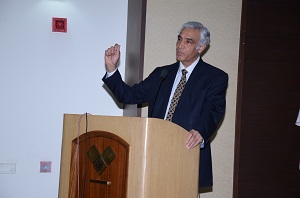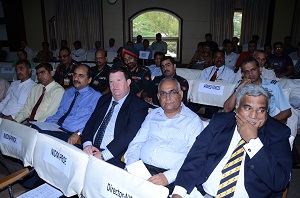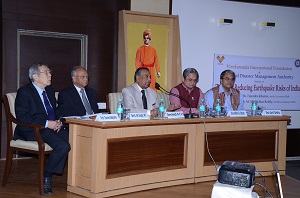The Vivekananda International Foundation (VIF) organized a seminar ‘Towards Reducing Earthquake Risks of India’ in collaboration with National Disaster Management Authority (NDMA) on April 12, 2012. Held, by coincidence, against the backdrop of a powerful earthquake which had taken place a day before off the coast of Indonesia leading to a Tsunami warning across 28 littoral states of the India Ocean including India, the conference attracted a large number of people including subject experts. Coming shortly after the success of VIF’s first conference on disaster risks reduction, which was held on 24 November 2011, the latest seminar on reducing risks from earthquakes clearly demonstrated the Foundation’s unwavering commitment to create mass awareness about the recurring phenomenon of natural disasters in India as also what needs to be done to insulate the country from their devastating consequences both in terms of life and property.
The conference witnessed an impressive array of technical experts, including representatives from the NDMA and the reputed Indian Institute of Technologies (IITs) sharing a whole range of perspectives on earthquake risk mitigations culled from both global and national experiences. Mr. Tejendra Khanna, the Hon’ble Lieutenant Governor of Delhi and Mr. M. Shashidhar Reddy, Vice Chairman NDMA, were among notable invitees who shared their valuable insights on the subject. Prof. Tsuneo Katayama, former President, International Association for Earthquake Engineering and the present Director, World Seismic Safety Initiative, shared a Japanese perspective on disaster risk management. Prof. NVC Menon, former member NDMA, Prof. CVR Murty, IIT Chennai, Prof. Ravi Sinha, IIT Mumbai, Mr. Anil Sinha, Vice Chairman, Bihar State Disaster Management Authority, Mr. Mihir R. Bhatt, Director, Disaster Mitigation Institute Gujrat and Mr. KM Singh, member NDMA were among other key speakers at the seminar. Mr. Ajit Doval made the welcome address while General NC Vij, a retired Chief of the Indian Army and former Vice Chairman NDMA made the valedictory address at the seminar. The vote of thanks was proposed by Lt. Gen (retd) Ravi Sawhney, the former DG of Military Intelligence.
 The inaugural session witnessed two speeches, one each by the Chief Guest and the Guest of Honour, the Hon’ble LG of Delhi and the Vice Chairman of NDMA respectively. The agenda for the ensuing discussions however was set by the Director himself who said in his welcome address that India rose marvelously to natural disasters but she lacked advance preparations to meet them. The national level initiatives in this direction were outlined by Mr. Reddy in his inaugural speech. He assured the audience that the early warning system put in place by India in the post 2004 Tsunami phase has come up as one of the best in the world. Citing from a recent study on earthquakes done by Nicholas Ambraseys and Roger Bilham, Mr Reddy said that more than eighty percent of deaths which occurred due to earthquakes occurred in countries which were high on corruption index. Corruption leading to poor building constructions is largely responsible for the maximum number of deaths during earthquakes. The situation however is particularly bad for India, a country woefully short on the number of trained technical manpower - architects, and masons among others. In so far as Delhi is concerned, there are many unsafe buildings in the city which do not even need an earthquake to collapse. Mr. Reddy however expressed his satisfaction that people are becoming increasingly aware about the problem. The Finance Commission has approved a pilot project worth Rs. 24 cr which is aimed at disaster risk mitigation and includes among other measures retrofitting of select buildings across India. At present, there is no laid down policy with regard to retrofitting in the country. The NDMA however hopes to come out soon with these guidelines. Besides, the agency has been also active on several other fronts including conducting mock drills to sensitize the general public to respond efficiently to earthquakes as also scenario-based exercises for technical experts to learn from past experiences.
The inaugural session witnessed two speeches, one each by the Chief Guest and the Guest of Honour, the Hon’ble LG of Delhi and the Vice Chairman of NDMA respectively. The agenda for the ensuing discussions however was set by the Director himself who said in his welcome address that India rose marvelously to natural disasters but she lacked advance preparations to meet them. The national level initiatives in this direction were outlined by Mr. Reddy in his inaugural speech. He assured the audience that the early warning system put in place by India in the post 2004 Tsunami phase has come up as one of the best in the world. Citing from a recent study on earthquakes done by Nicholas Ambraseys and Roger Bilham, Mr Reddy said that more than eighty percent of deaths which occurred due to earthquakes occurred in countries which were high on corruption index. Corruption leading to poor building constructions is largely responsible for the maximum number of deaths during earthquakes. The situation however is particularly bad for India, a country woefully short on the number of trained technical manpower - architects, and masons among others. In so far as Delhi is concerned, there are many unsafe buildings in the city which do not even need an earthquake to collapse. Mr. Reddy however expressed his satisfaction that people are becoming increasingly aware about the problem. The Finance Commission has approved a pilot project worth Rs. 24 cr which is aimed at disaster risk mitigation and includes among other measures retrofitting of select buildings across India. At present, there is no laid down policy with regard to retrofitting in the country. The NDMA however hopes to come out soon with these guidelines. Besides, the agency has been also active on several other fronts including conducting mock drills to sensitize the general public to respond efficiently to earthquakes as also scenario-based exercises for technical experts to learn from past experiences.
 Sharing the perspective of the Delhi government on the risks from earthquakes in Delhi, the Hon’ble Lieutenant Governor Mr. Tejendra Khanna remarked that a staggering seventy percent of the buildings in East Delhi were unsafe from earthquakes as these were built on pieces of soil, whose load bearing capacity were much less compared to other parts of the city. He further observed that strict enforcement of regulations and building bye laws were necessary to protect the city from natural disasters such as earthquakes. To that end, it is important that all those who are in the business of house constructions, especially the builders adhere to correct safety norms. While the Hon’ble LG stressed the need for a policy and an institutional framework to undertake retrofitting of unsafe buildings, he categorically stated that people living in unsafe houses needed to be moved away to temporary shelters to allow for reconstruction to take place, should there be no scope for retrofitting of those buildings.
Sharing the perspective of the Delhi government on the risks from earthquakes in Delhi, the Hon’ble Lieutenant Governor Mr. Tejendra Khanna remarked that a staggering seventy percent of the buildings in East Delhi were unsafe from earthquakes as these were built on pieces of soil, whose load bearing capacity were much less compared to other parts of the city. He further observed that strict enforcement of regulations and building bye laws were necessary to protect the city from natural disasters such as earthquakes. To that end, it is important that all those who are in the business of house constructions, especially the builders adhere to correct safety norms. While the Hon’ble LG stressed the need for a policy and an institutional framework to undertake retrofitting of unsafe buildings, he categorically stated that people living in unsafe houses needed to be moved away to temporary shelters to allow for reconstruction to take place, should there be no scope for retrofitting of those buildings.

Over the next two sessions, a galaxy of eminent panelists gave detailed presentations on various dimensions of the problem. While the first session focused on the magnitude of the problem, the second session centered on managing the earthquake risks efficiently. Giving a historical perspective of Japan’s preparedness against earthquakes, the globally renowned professor of seismology, Tsuneo Katayama underlined that while earthquake prediction is difficult to realize in the near future, structural reinforcement remains the only practical solution. He also made a point that whatever laws are enacted to protect us against the wrath of the nature must be observed meticulously by everyone. The noted seismologist wisely cautioned, “Nature is not always kind to us. Nature is watching for our most unguarded moment”. A three dimensional visual presentation was also made during the seminar as part of an effort to sensitize the audience towards earthquakes. Also on display were some of the equipments used by the National Disaster Response Force (NDRF) as part of their relief and rescue operations across India and overseas.
The seminar concluded with General (retd) NC Vij, former Vice Chairman NDMA delivering the valedictory address.
He made the following key observations:
- An informed and well prepared public i.e community is the best response to earthquakes.
- Compliance of the techno-legal regime.
- Creating credible disaster response forces at all levels coupled with Civil Defence and fire and emergency forces will provide a very credible response capability at all levels.
- Disaster resilience must be built up as part of the developmental process. This should be applicable to States and Corporate as well, as it has already been made applicable in the Centre.
- All the housing loans in the country should be linked with earthquake safety norms.
Report prepared by Sanjay Kumar





